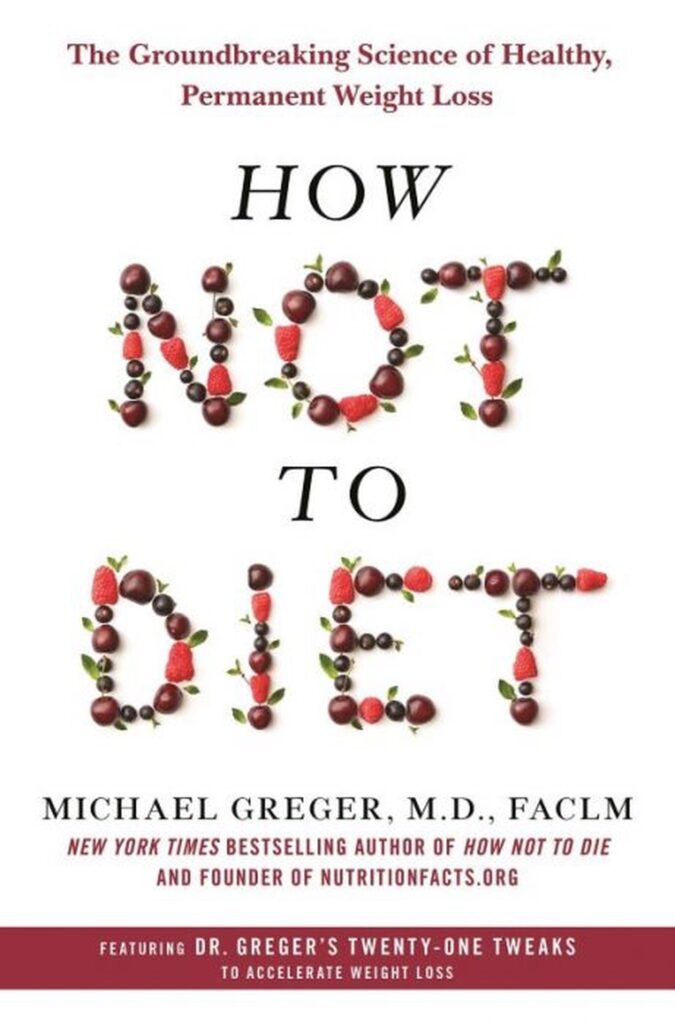Sharing my learnings from the book, How Not to Diet by Michael Greger
How Not to Diet by Michael Greger
Every month seems to bring a trendy new diet or weight loss fad—and yet obesity rates continue to rise, and with it a growing number of diseases and health problems. It’s time for a different approach. Enter Dr. Michael Greger, M.D., FACLM, the internationally-renowned nutrition expert, physician, and founder of Nutritionfacts.org. Author of the mega-bestselling How Not to Die, Dr. Greger now turns his attention to the latest research on the leading causes—and remedies—of obesity. Dr. Greger hones in on the optimal criteria to enable weight loss while considering how these foods actually affect our health and longevity. He lays out the key ingredients of the ideal weight-loss diet—factors such as calorie density, the insulin index, and the impact of foods on our gut microbiome—showing how evidence-based eating is crucial to our success. But How Not to Diet goes beyond food to identify twenty-one weight-loss accelerators available to our bodies, incorporating the latest discoveries in cutting-edge areas like chronobiology to reveal the factors that maximize our natural fat-burning capabilities. Dr. Greger builds the ultimate weight loss guide from the ground up, taking a timeless, proactive approach that can stand up to any new trend. Chock full of actionable advice and groundbreaking dietary research, How Not to Diet will put an end to dieting—and replace those constant weight-loss struggles with a simple, healthy, sustainable lifestyle.

- Fat is the new normal.
- Humans were born to eat. humans developed an evolutionary preference for eating and storing calories when possible. And they developed an inbuilt understanding of – and preference for – calorie-dense foods.
- weight gain isn’t unusual or unexpected. Overweight bodies are doing what nature has taught them to do when confronted with excess calories. And today, we are confronted with more excess calories than ever.
- becoming overweight is a normal, natural response to the abnormal, unnatural ubiquity of calorie-dense, sugary and fatty foods
- Researchers have decisively concluded that calorie intake is a far bigger problem for obesity than a lack of exercise.
- The modern food industry is giving us more calories than we need.
- Weight-loss is a $50 billion industry. But the truth is, the industry offers more fads and quick fixes than sustainable results.
- If you want a truly effective weight-loss diet, it has to be based on scientific evidence.
- Fiber contains no calories and is indigestible. It just bulks out our poop. But it’s incredibly valuable for weight loss.
- eating more fiber reduces your overall calorie intake
- fiber reduces the amount of calories you absorb.
- Fiber is like a calorie discounter: eat a high fiber diet and you’ll lose weight simply because not all the calories make it into your system.
- best sources of fiber: legumes and whole grains like beans, chickpeas, and lentils.
- high glycemic load – or sugar spike – has a greater negative impact on your appetite and on fat burning. foods associated with high glycemic load tend to drive cravings a little while after you’ve eaten.
- Low-glycemic foods help counter metabolic slowdown.
- Well-processed carbohydrates like corn flakes, white rice, potatoes, and white bread are all classic high-glycemic foods. Avoid these in favor of legumes, fruit, and non-starchy vegetables.
- A truly low-fat diet is effective for weight loss but involves less fat than you think. the problem with fat is that it is fattening. Because it is already fat, our bodies store it easily as body fat.
- how can we minimize fat intake?
- cutting down on all but the leanest meat is important
- cut down on added oils. cook with wine, sherry, vinegar, or a little broth.
- Sugar reduction leads to weight loss. sugar is harmful is that it encourages us to eat more.
- You should be getting no more than 5 percent of daily calories from added sugars
- Losing weight isn’t just about eating smaller portions; it’s about reducing calorie density.
- how can you reduce the calorie density of your diet?
- swap out added fats and sugars and bring in fruit and non-starchy vegetables instead
- Some vegetables, like celery or zucchini, can be up to 95 percent water, while apples and pears are also mostly water and air.
- Eat things like nuts, oil, and cheese sparingly.
- Legumes – beans, chickpeas, lentils, and split peas – belong to both the vegetable food group and the protein group. They are packed with the protein, iron, and zinc that you might expect from an animal-protein source, like meat. But they are also a great source of nutrients associated with vegetables, like fiber and potassium.
- A plant-based diet is a sustainable and proven approach to weight loss.
- the best thing about a plant-based diet is that there’s no limit to how much you can eat.
- Boost weight loss by embracing accountability and front-loading.
- Researchers regard self-monitoring as the foundational behavior for weight loss. it’s recommended that dieters should weigh themselves regularly
- think about when you eat. shifting your main meal from dinner to lunch will help.
- we burn off more calories in the morning, due to something called diet-induced thermogenesis. That’s the amount of energy our body needs to digest a meal. Our bodies use 50 percent more calories to digest our breakfast than our evening meal, leaving fewer calories to be stored as fat.
- Drink plenty of water and get plenty of sleep to boost your weight-loss program.


Leave a Reply